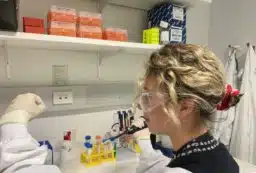320 tonnes of acid spills into river- Ben Wilson
Research into acid-producing soils along major rivers in northern NSW has illustrated the threat posed by Mother Nature, not only sugar cane farmers, on fish stocks in the region, according to Dr Ben Wilson from Charles Sturt University.
Working with colleagues from the University of NSW and the Australian National University, Dr Wilson has found that droughts are also a major cause of naturally occurring sulfuric acid that kills commercially important fish stocks in the rivers.
“Earlier opinions placed blame for fish kills solely on land drainage by sugar cane farmers. But our research group has proved this wrong when we found natural drought conditions were the main source of the sulfuric acid built up in the soils,” Dr Wilson said.
“These coastal soils contain a natural compound called pyrite, which changes into sulfuric acid when exposed to air. Fish kills usually occur when heavy rains wash the acid from the fields, at a rate of up to 350 tonnes of sulfuric acid per month from the catchment into the rivers.
“However, the kills did not always occur after every period of heavy rain, particularly when the soil was very dry,” he said.
“A hectare of this coastal soil normally holds thousands of tonnes of acid and water. If we can stop the acid draining away from the fields, while maintaining a productive sugar cane industry, we can protect local fisheries and the coastal environment.”
Dr Wilson said there was no simple solution. Ongoing research in a cane field next to the Tweed River in Far North NSW has shown that where farmers have drained previously natural swamps next to the Tweed for growing sugar cane, the amount of air in the soil has increased and more sulfuric acid was produced.
The ongoing situation is being monitored using equipment that constantly records environmental factors in the field. Data from the equipment is then transmitted every five minutes via satellite communications to researchers in Albury and Sydney.
Using the data, CSU Honours graduate, Liz Ash has developed a computer program that attempts to predict when acid will seep from the field into the river, which can be used to help manage environmental problems caused by acid leaching into the coastal rivers.
Dr Wilson is a lecturer with CSU’s School of Environmental and Information Sciences, based at Albury-Wodonga.




 Fresh Science is on hold for 2022. We will be back in 2023.
Fresh Science is on hold for 2022. We will be back in 2023.